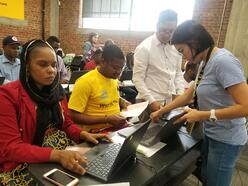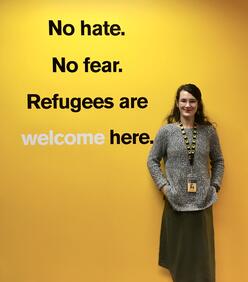Earlier in October, the International Rescue Committee (IRC) in Salt Lake City celebrated Digital Inclusion Week by participating in Utah Communities Connect’s first Utah Digital Summit. The summit gathered local and state leaders to “discuss how digital inclusion drives economic, education, health, and civic engagement outcomes in the 21st century.”
Staff from the IRC in Salt Lake City, including Krysti Nellermoe, education program supervisor, and Macee Rea, digital inclusion coordinator, moderated a panel about digital inclusion in the community. “This event today, this summit, is to bring together all of you and our great panelists, because I think together is the only way we are going to be able to address these issues holistically as a community, and it’s not one organization and it’s not one person able to do that,” Krysti explained.

So, what is digital inclusion, and why is it important?
Ask Macee Rea, our digital inclusion coordinator, and she would say: “Digital inclusion is including those left out of the digital world in it. It’s 2019, and you can’t access your fullest capacity and your highest standard of living without being included digitally—that's anything from being on your school’s, [or your] children’s school’s, website, learning how to grocery shop online, or educating yourself online.”
The IRC in Salt Lake City began its digital inclusion efforts in 2017 with the goal of creating equitable access to three aspects of the digital world: broadband internet, devices and education. “There was a real push to get at least one device as well as internet in each new arrival family home,” Macee explained.
With increased access to digital devices came the need to provide educational opportunities and training on how to use the new devices, leading to the creation of the Tech Mentor Volunteer program. Tech Mentors work with newly arrived refugees for four to six weeks “delivering personalized instruction on digital literacy, everything from the pre-basics, learning what your home button is and does and learning how to rest your hand on the mouse, to learning Microsoft applications, the other software suites and beyond. [The program is] very individualized. We really want it to be based on the clients’ interests.”

Macee explains the importance of including refugees in digital inclusion efforts: “It’s important to include refugees in this because the second they step foot in our country, we have a responsibility as citizens of America to welcome them and to make space in our communities for them, and we can’t do that without making digital space for them.” As with all of our programming, the IRC in Salt Lake City strives to make digital inclusion a gender equitable program. At a minimum, Macee and the education team hold quarterly Tech Workshops designed specifically for women and girls to help them access and understand how to use technology.
Macee has ambitious plans for the digital inclusion program at the IRC in Salt Lake City, including incorporating digital inclusion throughout all of the programs we offer. “I have no plans but to really help build this program up. It really needs to be in every program that exists already. It’s kind of two different processes: trying to include digital inclusion in every other program that we have as well as trying to build up this digital inclusion program as a full-on entity.”
To start this process, Macee hopes to work with newly arrived refugees and their caseworkers to help them budget for internet. Usually a burdensome expense, the IRC in Salt Lake City has built partnerships to help refugees and other low- to moderate-income families access inexpensive internet options from PCs for People and Internet Essentials from Comcast. With more new arrivals connected to the internet, “that will make our waitlist [for Tech Mentors] a lot longer, but better in the long run,” Macee explained. She hopes to recruit more tech mentor volunteers to match with these newly arrived refugees who have access to the internet.
Are you interested in becoming a Tech Mentor volunteer? Email us at VolunteerSLC@rescue.org to learn more and receive the upcoming training dates.